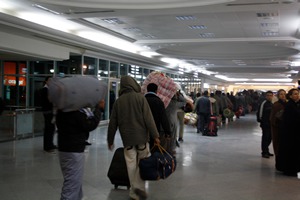'People should be accommodated in communities where they can be welcomed, not warehoused in hotels.'

In June this year, immigration minister Robert Jenrick, announced a new anti-migrant strategy aimed at reducing costs and act as a deterrent to those arriving to Britain in small boats.
Known as ‘Operation Maximise,’ the initiative involves cramming as many people into accommodation provided by the Home Office for asylum seekers.
Prior to ‘Operation Maximise’ being launched, scabies broke out in a hotel accommodating asylum seekers in Stockport. The council warned of people being ‘cooped up’ inside the hotel for a number of months. Human rights charity, Rapar, said insects were found in food and piles of rubbish were left in corridors.
Responding to the dire, crammed conditions at the accommodation, Stockport council leader Mark Hunter said:
“Asylum seekers have been cooped up… for months and this inhumane treatment acts as a Petri dish for mental health issues in a cohort that are already vulnerable.”
Despite cases like this and subsequent warnings, the government still pressed ahead with its ‘Orwellian-sounding plan to cram people into absurd room-sharing arrangements,’ as Enver Solomon, chief executive of the Refugee Council described it.
Less than six months into the strategy being launched, and concerns are mounting about the safety, health and wellbeing of the residents being forced to room share.
NGOs have also identified cases of age-disputed children being forced to shared rooms with adults they were not related to.
Hounslow council, home to one of the largest numbers of asylum seeker hotels in Britain, released a new annual public health report. The report warned that the government’s the room-sharing policy “further increases mental health risks for asylum seekers,” adding that “the experience of asylum seekers in hotels has deteriorated due to the new maximisation policy.”
Concerns are also mounting for the safety of LGBTQ+ asylum seekers.
An investigation by the Guardian identified several incidents concerning homophobic abuse. In one case, a transgender man was sleeping on a staircase because he was afraid for his safety in the accommodation. The man informed how he had been beaten and raped in his home country. On arriving to the UK, the Home Office had put him in a shared room, where he had woken up to other men in the dormitory attempting to take off his clothes.
“The hotel staff blocked my room card [because I refused to stay in the room, but] they said I had to share. I could not do it. I slept outside the room on the stairs and cried all night. It was the worst night of my life since I arrived in the UK,” said the man.
The Home Office eventually agreed that he did not have to room share.
Another case involved a gay man being afraid to get undressed in shared living space due to the homophobic abuse he encountered.
One lesbian woman had been forced to sign a document stating that she agreed to room share, despite being terrified of what might happen to her.
“I will have to hide my identity in my own room. So many of us are dealing with mental health issues and trying to overcome trauma but the letter I signed said I do not have the right to object to room sharing,” she said.
Emma Birks, of the charity Asylum Matters, warned that the government’s hotel maximisation policy is seeing traumatised people crammed together in hotel rooms and other forms of temporary accommodation.
“We are seeing them create conditions that cause physical and mental harm to vulnerable people who are seeking safety here in the UK. People should be accommodated in communities where they can be welcomed not warehoused in hotels,” she said.
In response to the concerns, a Home Office spokesperson told the Guardian:
“To reduce hotel use, asylum seekers will routinely share rooms with at least one person where appropriate. This minimises the impact on communities while we stand up alternative sites.”
To reach hundreds of thousands of new readers we need to grow our donor base substantially.
That's why in 2024, we are seeking to generate 150 additional regular donors to support Left Foot Forward's work.
We still need another 117 people to donate to hit the target. You can help. Donate today.



